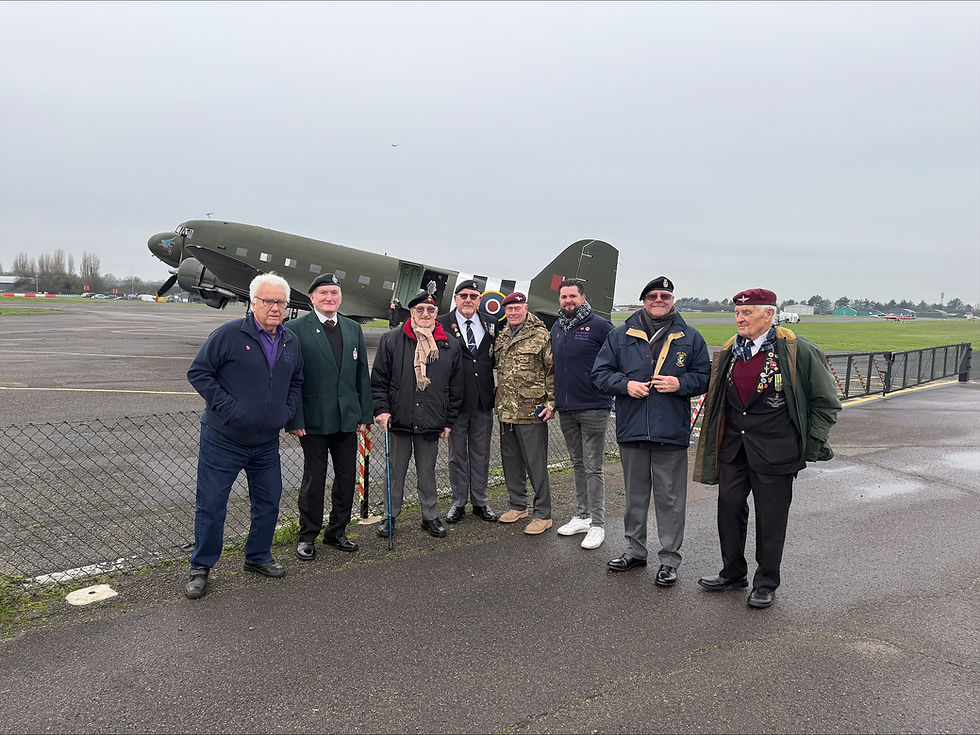94-year-old navy veteran reflects on 75th anniversary of VJ Day, SW Londoner
- taxicharity
- Aug 14, 2020
- 4 min read
Updated: Jan 4, 2021
August 15 marks the 75th anniversary of Victory Over Japan Day, the day the Japanese surrendered bringing about an end to the Second World War.
VJ Day remembrance services across the UK have been scaled back significantly this year due to Covid-19 restrictions.
Alfie ‘Fred’ Lee, 94, from Hampshire, who took part in the Normandy landings in early June 1944, before being re-deployed, held a two-minute silence on Saturday, alongside two friends, to remember those who never made it home.
Reflecting on his time in the navy, Mr Lee said: “All I can say is, it was a wonderful experience. Frightening at times, very lucky at times. Some people never had that luck, I did. I can honestly say that I never really regretted volunteering.”
Victory in Europe Day, or VE Day, the day the German army surrendered on May 8 1945, is more widely commemorated in the UK but Allied forces continued to fight against the Imperial Japanese Army for several months afterwards.
JOINING THE NAVY
Mr Lee volunteered for the navy on August 2 1943, just after he turned 17.
Despite signing up to the navy as a ‘boy’, owing to his age but also his youthful appearance, Mr Lee achieved his goal of becoming a stoker after managing to convince the priest in Skegness, where Mr Lee was completing training as a telephonist, to have a persuasive word with the Skipper.
“A stoker looks after the engine room and the boilers on board the ship.
“The reason I wanted to be a stoker was, at the time of volunteering, I had done three years as a boiler maker’s apprentice, so I really wanted to carry on being a stoker, which was part of my trade,” said Mr Lee, who admitted that at 17 he should never have been appointed a stoker.
Mr Lee was detailed to HMS Nith, a newly built river-class frigate named after the River Nith in south west Scotland and from February until June 1944, HMS Nith took part in nightly training exercises on the south coast of England in preparation for the D-Day landings.
On June 6, Mr Lee began his four-hour shift at 4am and was still in the boiler room when the ship landed troops on Gold Beach at 7.25am.
“Anyway, when I got up at 8 o’clock, all hell had let loose. It was unbelievable… the noise, shells dropping all around. We were a mile and half off the beach,” said Mr Lee.
In the early hours of June 24, HMS Nith was struck by a guided German bomber that landed on deck before blowing up.
Mr Lee said: “We had eight killed and 26 wounded on-board. I was fortunate really, I should have been on starboard side but that night when I came off watch, they put me on port side action stations. So, I was very very lucky.”
HMS NITH
After undergoing repairs, HMS Nith set sail in February 1945 calling in at Gibraltar, Aden (Yemen), Port Said (Egypt), Bombay (India) before making it to Rangoon (now Yangon) where the ship was due to engage the Japanese.
Just outside Rangoon, the message through to the ship that the Japanese had left Rangoon and there was talk they were surrendering.
Mr Lee said: “On the way up the river, that was when the message came through that the Japanese had left Rangoon and there was talk they were surrendering.
“We stopped in the river for a while but eventually we were the first navy ship up into Rangoon harbour and when we got up there, one of the first things I noticed was there was a pinging on the side of the ship… ping, ping, ping.
“I said to one of the chaps, ‘What’s that’ and he said: ‘Get your head down, they’re firing at us’. The Japanese were up in the cranes – they had left a rear-guard behind.”
After the RAF cleared out the rear-guard, and the Japanese officially surrendered, HMS Nith was charged with transporting troops stopping off at various ports including Saigon (now Ho Chi Minh City), where Mr Lee spent Christmas Day on a tea plantation.
“We went to various different places, with our ship, and people went mad. They used to come out in all sorts of little boats surround the ship.
“We used to drop the odd packet of cigarettes over the side for them. They looked as though they were freed as much as we were really. They really enjoyed it,” said Mr Lee.
After thirteen months, HMS Nith returned to England in March 1946 to little fanfare.
“We got back into Plymouth. It was cold, it was foggy. We dropped off the destroyer at Plymouth and we just sailed up to Harwich and joined the rest of the ships. There was nobody there to say hello, well done, thank you, nothing,” said Mr Lee.
“When I came back, I went back to my old job. I got married, I married my young school sweetheart. We were married for 66 years. I have a son, two daughters and five granddaughters and that is my life.”











